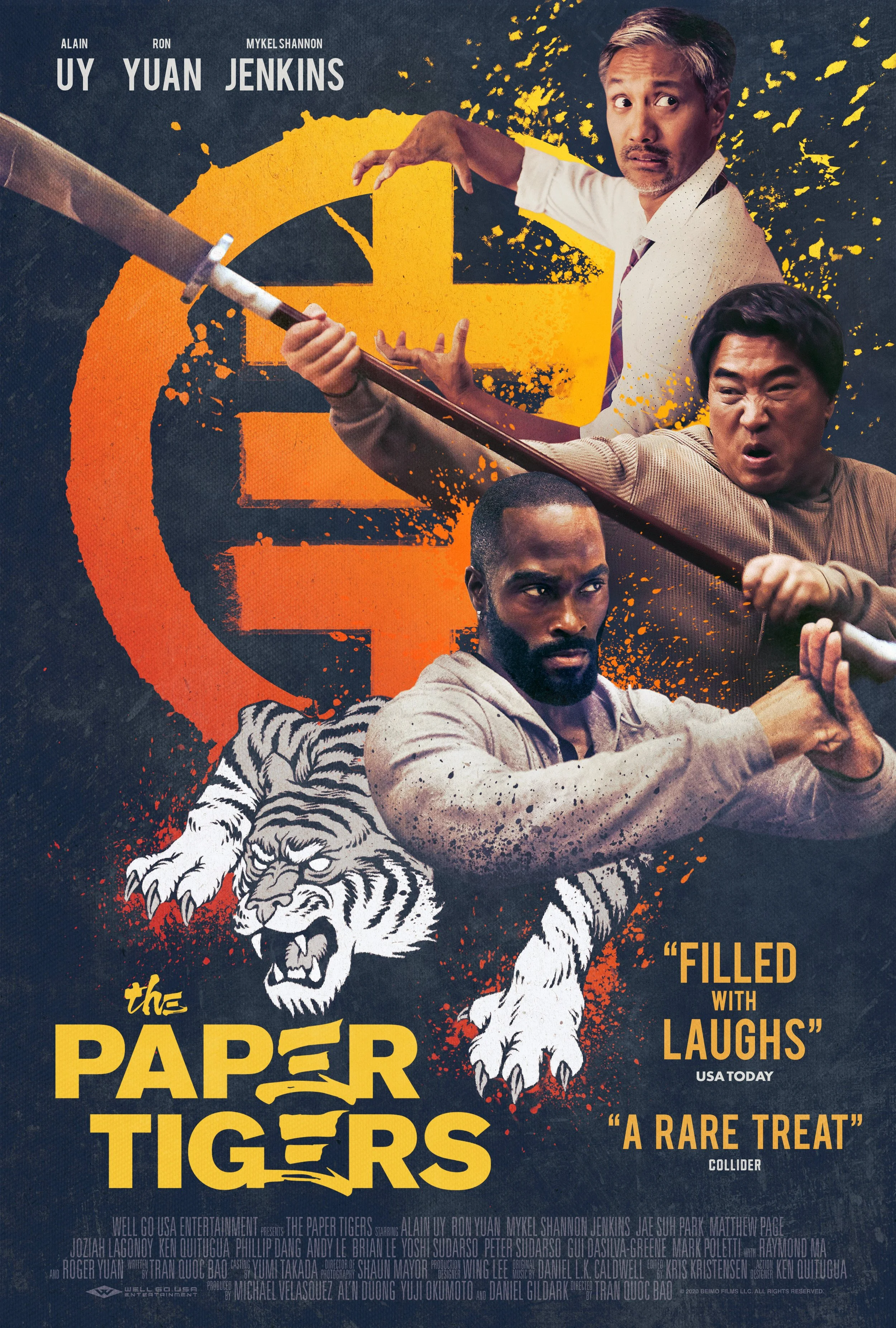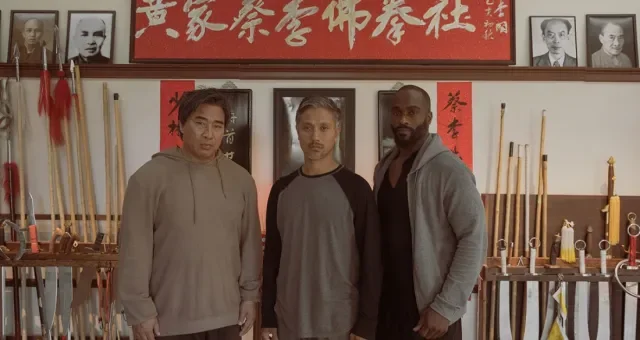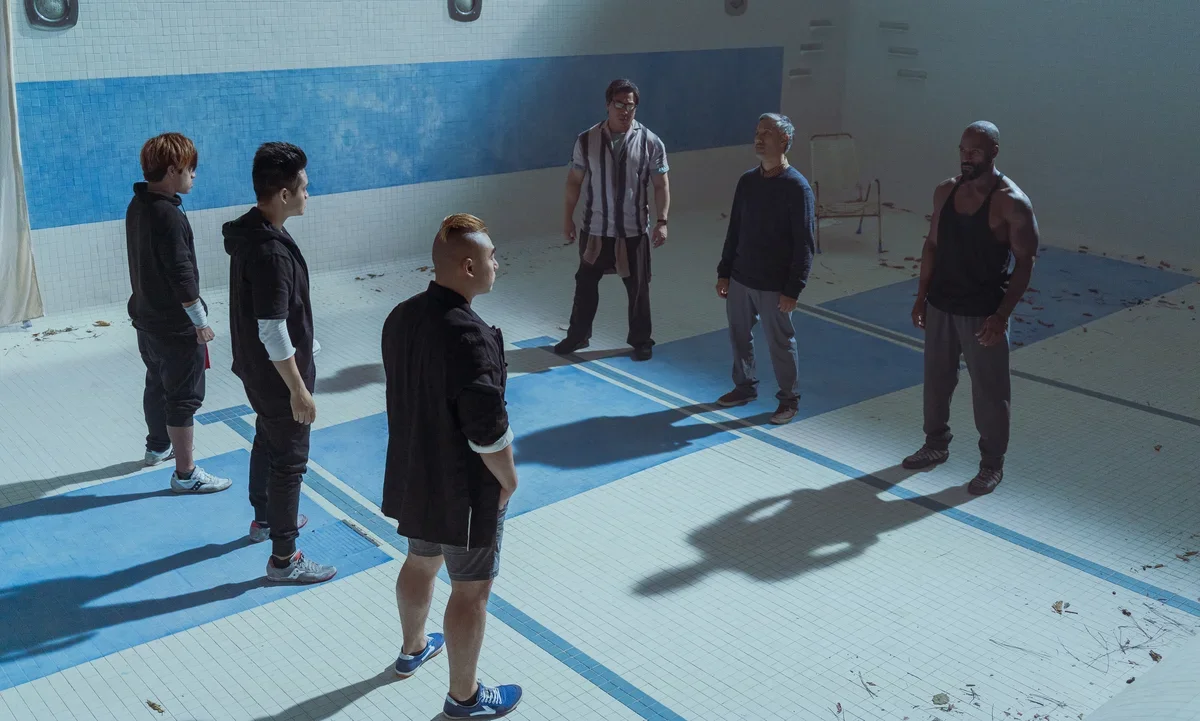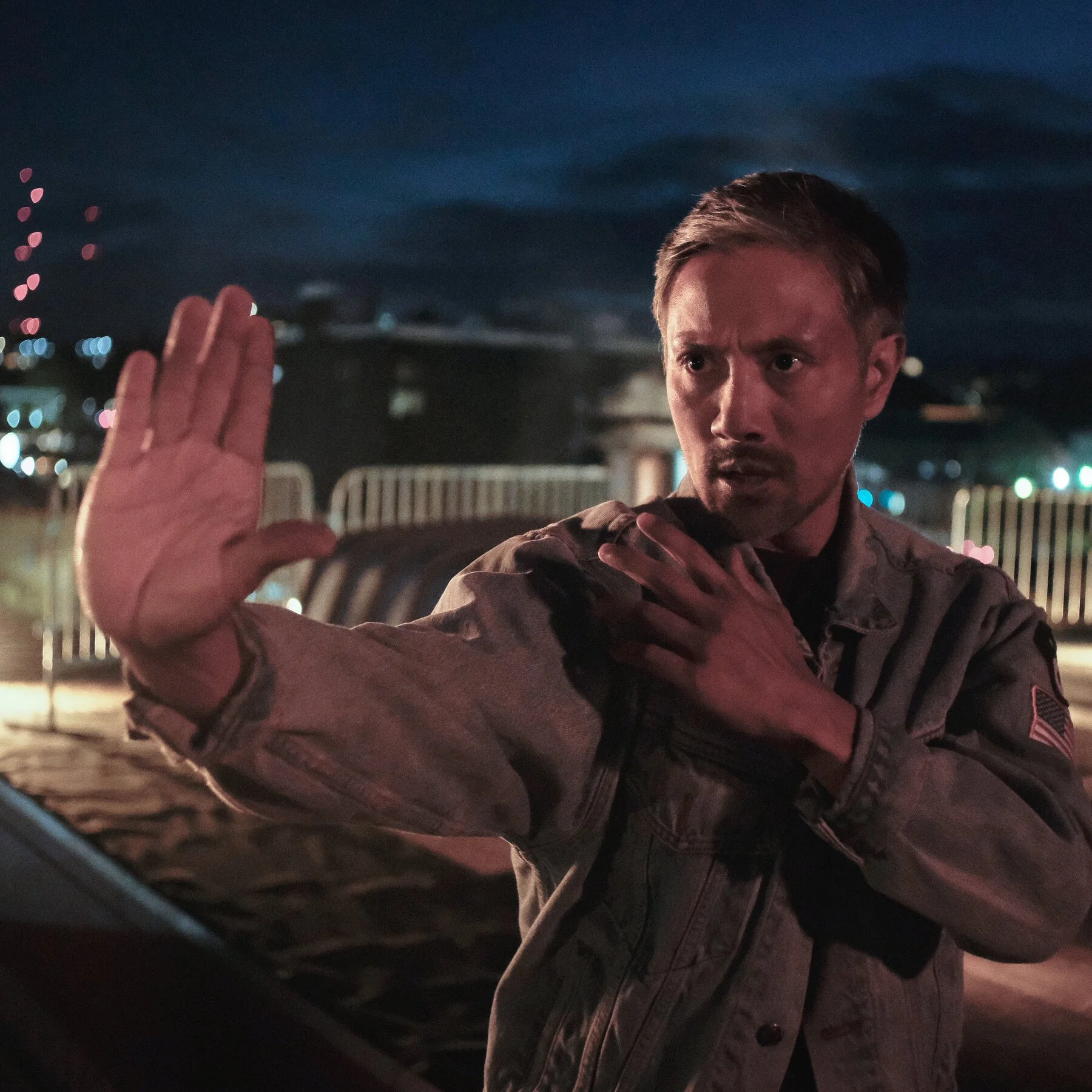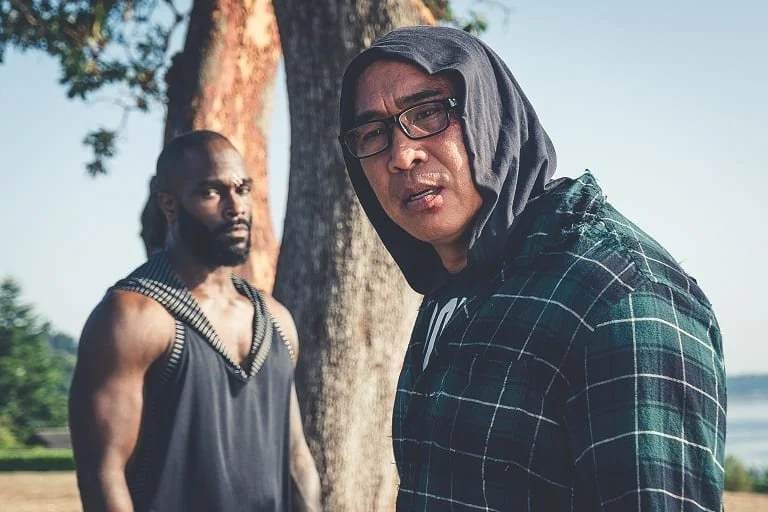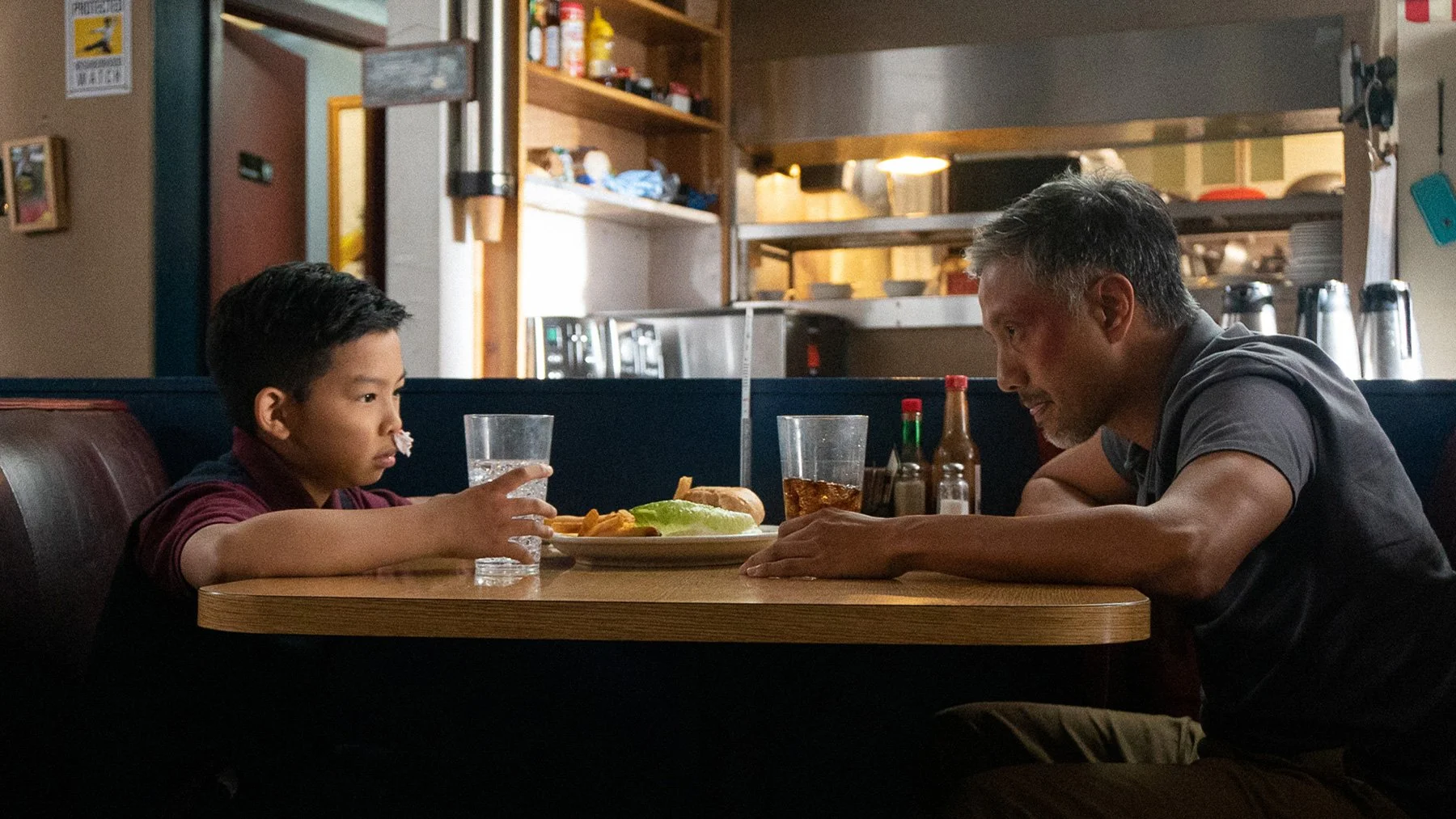We’ve had cozy mysteries, that’s a tried and true genre. We’ve even had cozy horror now, in a way, with Little Evil. And now I’d like to share with you a 2020 indie film on Netflix that may well be a truly cozy martial arts movie. So let’s get into writer-director Quoc Bao Tran’s feature film debut, The Paper Tigers.
We open on an older man stumbling into an alley as a mysterious assailant fights him. Poor old guy doesn’t stand a chance; he never makes it out of that alleyway. It’s at this point we flashback to when that old guy was younger. He was Master Cheung, a Sifu (also called Shifu), a teacher of Chinese gung fu (also known as kung fu, depending on what Romanization of the word you use), and he has only ever taken on three students. Jim, Hing, and the best student, Danny, aka Danny Eight Hands because he was so good, it seemed like he had eight hands. Together they called themselves the Three Tigers and they fought to defend their clan’s honor against other schools. Honor was a big part of their training, but being kids growing into teenagers who have never lost a fight, it’s hard not to let arrogance creep in. Over the years, though, a rift has driven them apart and the realities of middle age have set in.
Danny, played by Alain Uy (Helstrom), is a divorced dad, running late to pick up his kid. And when he does have him, he’s so busy that he has to cancel their fun day together to go get work done. On the way home, though, he’s jumped in front of his house—not to worry, it’s more of a vibe check than anything else. It’s his old friend Hing, played by Ron Yuan (Mulan, The Accountant), in town because of their Sifu’s death. He’s the one who has to break the news to Danny. At the funeral, still without Jim, they run into Danny’s old nemesis Carter, played by Matthew Page (Enter the Dojo, Odd Thomas), who is in charge of a different school now. There’s a lot of banter here between the Tigers and Carter, some of it quite juvenile, with a lot of cultural appropriation on the part of Carter. It’s played for laughs and it mostly works, but there’s a deeper story behind that which we’ll touch on later. But it’s Carter who drops the penny—the police believe that Sifu Cheung died of a heart attack, but Carter doesn’t buy it. He believes, as the audience knows, that the Sifu was murdered. This sets the three distant disciples on a path to reunite and find Sifu Cheung’s murderer.
Danny is skeptical, but Hing starts to go full Poirot, trying to connect the dots. But 25 years changes a lot of things. Hing walks with a limp now, permanently in knee brace, after getting injured on the job. Danny’s trying to prove he can do 50/50 custody and he has become a total pacifist now; after years of proving himself in fight after fight, he hasn’t thrown a punch or made a fist in two and a half decades. He tells his son never to fight, not even when being bullied. The better man walks away, he tells him. The better man finds a solution that isn’t fighting. Danny Eight Hands now works in insurance and drives a minivan. It’s not even one of the fancy new ones with all the gadgets I secretly enjoy getting as an Uber (I admit, I’m still a child, and remotely operated sliding doors makes me feel like I’m on the Enterprise) or even a Honda Odyssey, it’s an aging Toyota Sienna. The only one of them who has kept up with martial arts in any form is Jim, played by Mykel Shannon Jenkins (The Gods, Undisputed 3), who now has integrated other disciplines, such as Brazilian jujitsu, into his life. Gung fu is no longer a big part of it.
Three men, separated by 25 years and a rift that split them apart seemingly irrevocably, are brought back together to find justice for the man who taught them everything they knew. When they were old enough, Sifu Cheung had them take an oath to honor their Sifu, to be loyal to their brothers, and to defend the weak. Because that was always the point of any sort of violence to Sifu Cheung. Gung fu without honor is just fighting, he taught them; a lesson they didn’t always take to heart as much as they should have. But now as they find themselves reunited because of that man’s death, the idea of honor and defending the weak comes to the forefront of their minds.
The Paper Tigers has a lot going for it. I mentioned that some of the banter could be juvenile at times, especially between Carter and Hing, with Carter body shaming Hing and Hing making allusions to the side effects of the steroids he is certain Carter took. But where the comedy in this movie really works is the physicality. I have rarely seen a film that marries excellent fight choreography with great physical comedy in the way that The Paper Tigers does. Seeing these middle aged men try to go toe to toe with younger gung fu practitioners is full of funny moments injected into the very convincing fight scenes. It adds a layer of levity to the situation that is crucial to making this a cozy film. While it deals with serious subjects, the film always keeps just enough humor for things not to get too heavy. Well, most of the time. There were definitely moments that left me feeling very emotional, especially as the film draws to a close and they have to face the totality of their lives. They reminisce and trade regrets, each of them feeling still the weight of decisions they made when they were teenagers and now with the loss of Sifu Cheung, some doors are simply closed to them for reconciliation. Memory lane is a bittersweet road to drive down when you’re there because of someone who is no longer around. You may not have heard of many of these actors (I know I haven’t, despite the fact that I have seen some of them in other projects, including the awful live action Mulan), but they are able to convey so much emotion through just their facial expressions alone that you’d expect them all to be stars. Alain Uy especially does a great job as Danny, the clear star character of the film and Sifu Cheung’s senior student.
It’s hard sometimes to discuss films like this that are supposed to exist in the real world (there are some fantastical elements here, though, with ancient Chinese medicine and mythical moves; fairly standard martial arts movie tropes, but pulled off lovingly and with care) and yet advocate violence at times. A lot of the fighting in The Paper Tigers happens in a world of rules; when you fight, you fight with honor, and at the end of the fight, you walk away respecting the other party. Kind of like the secret assassin underworld of John Wick, people don’t break the rules without consequence. And the movie really stresses the need for honor when fighting and the need to stick up for those who are unable to defend themselves. Might isn’t right without a guiding hand; otherwise it’s just bullying. And The Paper Tigers is very clear about that. We live in a world where the defenseless are more than bullied, with extreme violence being used against them, and there aren’t enough people who are able to stand up to protect them. These bullies are in positions of power and acting without consequence. So to see a film like this, a film where three normal guys who have problems and have walked away from a life of discipline and honor find a way to stand back up and do the right thing really got me. The film has a lot to say about bullying, toxic masculinity, racism, and cultural appropriation and it does it all quite well. When Danny’s son confronts him about gung fu after defending a friend who was being bullied at school for who he is, Danny is forced to reconcile a life of pacifism with the life he used to lead, where his training was meant to defend the defenseless. He struggles with what the right thing to do is, both as a father and as a disciple of the slain master. I know I’m on record as being pretty down on fathers and, frankly, the only way Danny is getting a Father of the Year mug is if he buys one himself from Spencer’s Gifts, but seeing him try to be a better father to his son was truly touching.
As fun as this movie is, there’s proper depth to it, thanks to the excellent characters. While Danny is the main protagonist, Hing and Jim both have emotional weight and character journeys to go through as well. It’s them, their experiences, their genuine affection for each other and their Sifu, though strained at the time, that makes this movie more than just a fun action-comedy romp. It’s not trying to be Rush Hour, which is a fun movie in its own right, because it chooses to do more by telling personal stories that are very real. Regret is real. We live with the weight of our choices and once done, our actions can’t be reversed. We can do our best to make up for them, to atone, but there’s nothing that can actually undo the things you’ve done. Time may be a flat circle after all, but as we experience it, time only flows one way. Everything done is done forever. And these characters have to come to terms with their pasts if they’re going to have a future and make recompense for their choices. So it’s one part action-comedy, one part character drama and it comes together in a film that is likely to make you laugh and cry in equal, satisfying measure.
Sometimes the story of a movie’s production is almost as interesting as the movie itself. When trying to secure funding for the film, Quoc Bao Tran was told by studios that they wanted Bruce Willis to star and a role to be written for Nicolas Cage. As much as it might have been humorous to watch his nouveau shamanic acting in a film like this, it would have been a completely different movie and lost a lot of authenticity that makes it so special. Carter insists on being called Sifu now, a request that none of the Tigers will comply with, and he speaks in ancient Chinese proverbs when the Tigers have wait for him to repeat what he said in English. Carter’s cultural appropriation feels like a response to the pressures from Hollywood studios to whitewash a movie written and directed by an Asian-American who drew upon his experiences as a child growing up loving martial arts. Tran insisted on a minority cast, with all three leads being Asian or Black. And that goes so far to make this film not a corny, campy, inauthentic martial arts film where big Hollywood names dominate, but rather a love letter to martial arts films like The Karate Kid (with a very fun cameo from an actor from the film series and Cobra Kai) and Enter the Dragon that addresses real life problems. Tran turned to Kickstarter and eventually private investors to deliver the film as he wanted it to be. And not only is that admirable, he pulled it off with great success.
Even though it’s just 1 hour and 48 minutes, The Paper Tigers isn’t exactly breezy, because it does take its time to sit with the characters and slow the action down, but without the scenes where these three men reminisce and try to figure out what it means to be good men the movie just wouldn’t have worked. One of the most successful things about this PG-13 film is that it’s the kind of film that has a moral and is written in a way to accessible to people of all ages. It’s not often I get to watch a movie that is truly a family film. I cover kids’ media quite a bit and I love when they are able to get adults in on the fun as well, but this feels like a movie written for adults, but with kids in mind. You could gather the family around the television this coming Thanksgiving and watch this one with people of all ages and it will entertain them and more. The Paper Tigers is exactly the kind of film that I love to feature on this blog because it needs and deserves a bigger audience. It’s a textbook, Attack the Block level of hidden gem that I absolutely adore bringing to you. It’s not just a fun film that’s cozy; it has weight, it has meaning, and it’s the kind of movie that makes your life enriched for having watched it. That’s what art is supposed to do; enrich your lives, not just studio executives. With a 98% on Rotten Tomatoes and a 93% audience score, I don’t think you’ll be disappointed by opening up Netflix and joining the audience. I love this film and I think you will too.
